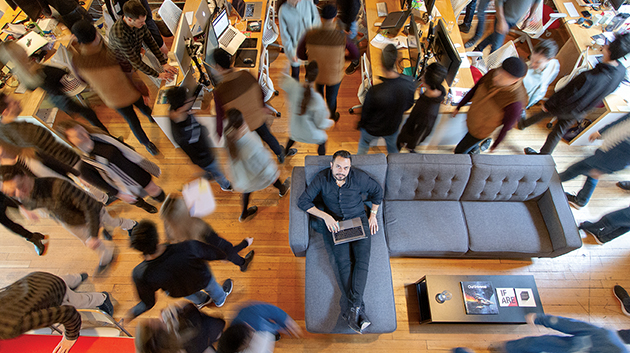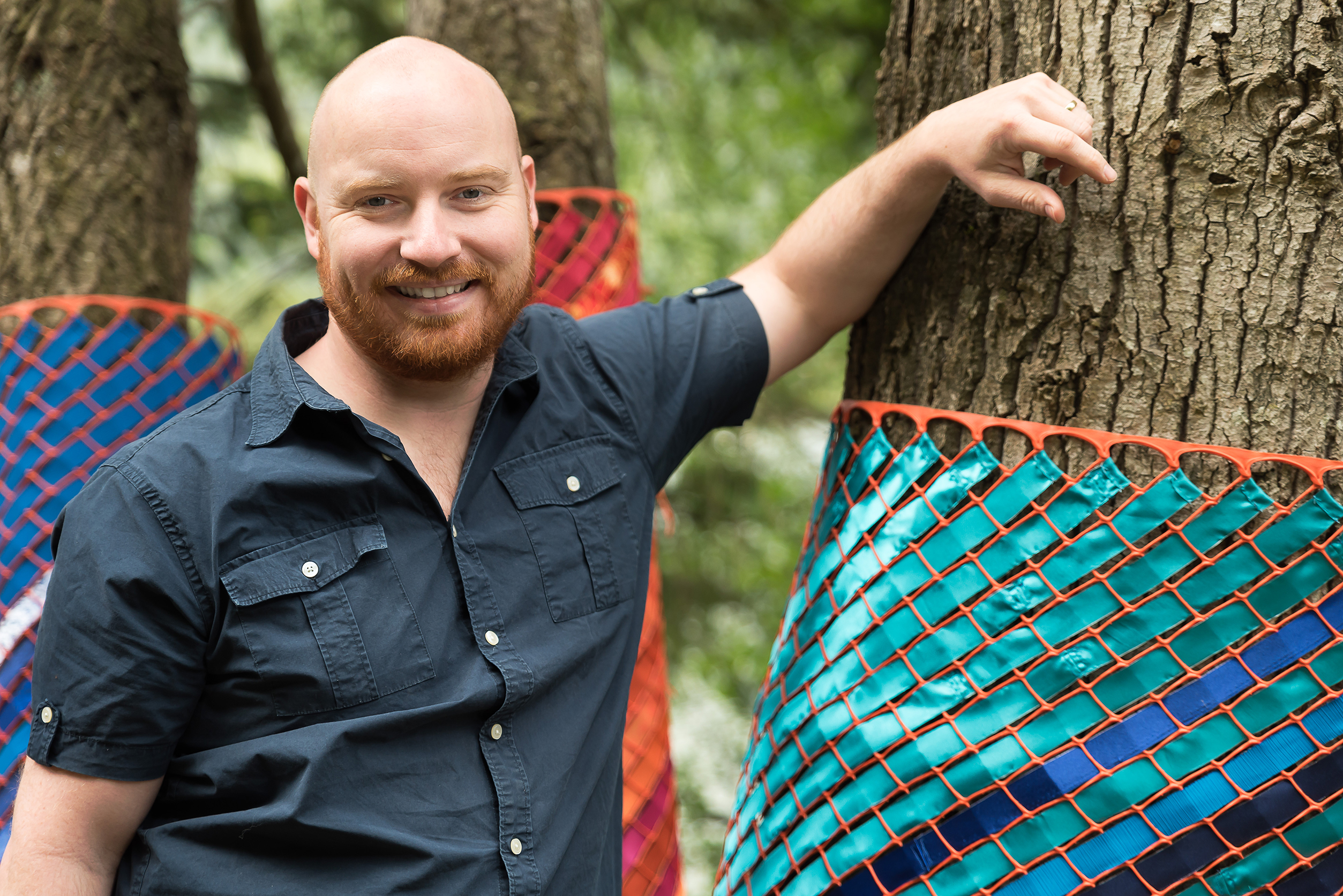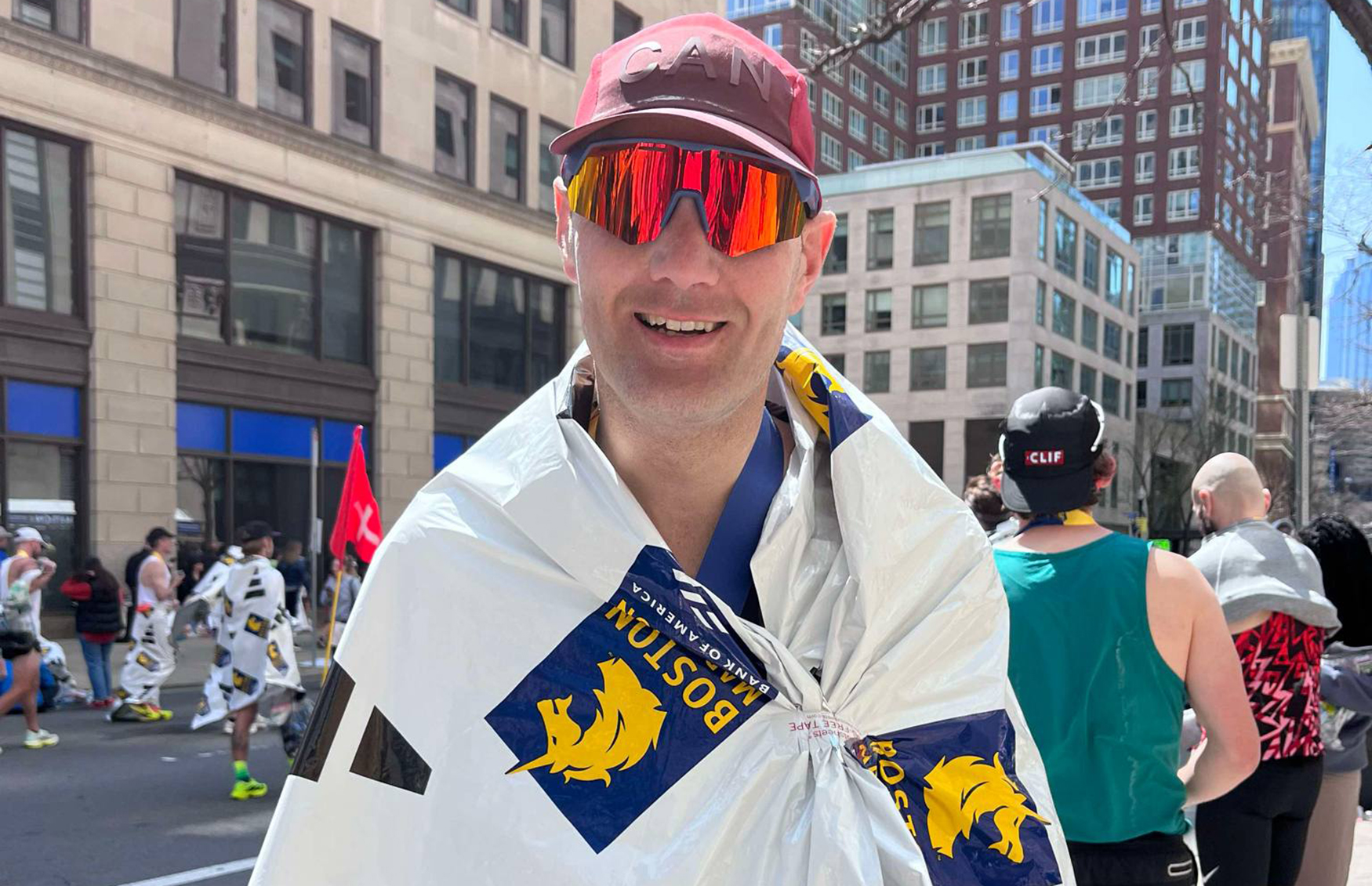The many lives of Mo Dhaliwal — alumni feature
When we asked Mo Dhaliwal to be the subject of a feature in UFV’s Skookum magazine, he was a little hesitant.
“I didn’t have a fantastic academic history at UFV. I left in my third year of the business program and never finished,” he said, attributing his spotty record to “all sorts of life challenges back then… and general foolishness. I never really made the choice not to continue and finish my business degree. I just left and never went back.”
But Mo is an alumnus. He completed his two-year Business Administration diploma, and his life since UFV makes for a great story — one in which his university experience plays a supporting role. So he relented.
“Happy to hear you’re interested in this tarnished penny.”
He may be tarnished in his own mind but he’s a shining star to many others.
Today Mo is chief strategist and co-founder of Skyrocket, a digital branding creative agency in Vancouver. And he’s a UFV alumnus who has come to appreciate the value of what he learned during his time here and who finds his education comes in handy when he least expects it.
There have been many stages of Mo since he enrolled in business studies at UFV in the late 1990s.
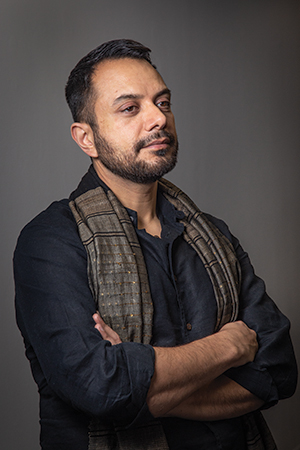 Reluctant student
Reluctant student
Like many high school students, Mo had dreams of leaving the suburbs behind and enrolling at a big urban university. But it was not to be.
“I was a troubled and depressed young man in my late teens. There was turmoil at home,” he recalls. “My high school marks slipped from the 90s to the 70s, and I was rejected by UBC and SFU. When I came to UFV I viewed it as slinking off to the local college. I didn’t appreciate it at the time.”
Once he began taking courses, he loved some of them and was less excited about others. Mo’s the kind of guy who embraces what catches his attention with extreme energy and he brought that enthusiasm to his arts electives.
“I burned through English, philosophy, anthropology. If I loved something, it’s all I wanted to do. But I wasn’t really feeling the business school love. There was a family assumption that I should study business but it was a disconnect from my lived experience at that time and I struggled through my business classes.”
He did enjoy his courses in business communication and entrepreneurism, foreshadowing his future career choices, and completed the other courses he needed to complete his diploma. And then he was gone.
Dot-com bubble boy
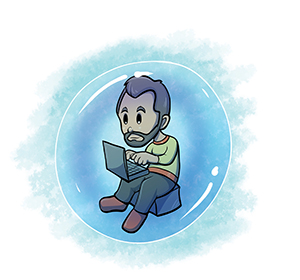 Mo was drawn away from his studies by the lure of the dot-com boom of the early 2000s.
Mo was drawn away from his studies by the lure of the dot-com boom of the early 2000s.
“I got a taste for the real world, and never went back to my studies.”
Or was it the unreal world? He went off to Silicon Valley, where a young person with coding skills could find success really quickly.
“I’d been playing around with software and coding since Grade 4, and suddenly my hobby coalesced with the tech boom and became incredibly fruitful.”
Bhangra booster and bankroller
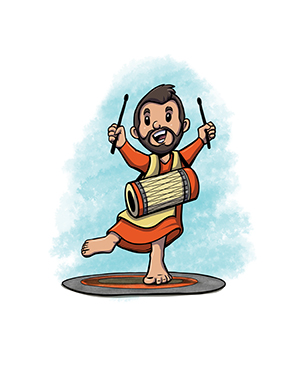 The tech life paid well, but it wasn’t feeding Mo’s soul.
The tech life paid well, but it wasn’t feeding Mo’s soul.
“By 2003, I was burned out from the tech industry and back in Vancouver. I felt the need to get involved in my community. I had talked with other Punjabi kids at UFV and we’d discussed starting a bhangra club, but we didn’t get it started. I wanted to create a brand and event that would be a beacon for the Indo-Canadian community.”
Working with some other volunteers, Mo incorporated the Vancouver International Bhangra Celebration Society. And lo and behold, he found a practical use for the business skills he’d absorbed while a reluctant UFV student.
“My marketing, communications, and finance studies all came into play, bringing what I had learned into the forefront. Our organization had quite a polished presentation and look, even if it was a bit of a shambles behind the scenes.
“My tech skills came into play here as well. The ‘hacking’ ethos of the tech world helped me develop interesting ways of growing the organization. I wrote a software script to comb through my history of forwards and chain emails. I asked our group members to allow script access to their email accounts as well. Day one, we had a mailing list of 40,000 people to blast with the VIBC message. When we launched, we LAUNCHED!”
He quit his telecommuting job and lived off his savings.
In fact, he bankrolled the Bhangra society with his own money.
“Salaries were ridiculously over-valued during the dot-com bubble, so I had the means. I was 25 or 26, I knew how to make things happen, and I felt more alive than I ever had. It was very exciting. I had grown up in domestic stress and this was something I had control over. I was drunk on that feeling.”
The Bhangra festival was a smashing success, and it attracted corporate sponsors.
Through one of the sponsors he met a friend who became a mentor and then his boss. He joined one of Vancouver’s premier marketing agencies, one that catered to the multicultural market.
Mr. Five Business Cards
 A frenzied period of business and volunteerism ensued.
A frenzied period of business and volunteerism ensued.
His boss and mentor was involved in many ventures and encouraged Mo to do the same.
“He normalized over-commitment for me, and I took to it. At one point I had five different business cards for different endeavors we were involved in, ranging from sustainability initiatives to an animatronic dinosaur company.”
Mo got very involved in the Vancouver arts community. One of his projects was creating a loyalty card program for the arts. That entailed making many contacts.
“For more than a year I walked into every arts organization and introduced myself as the Bhangra festival founder as a trust-building exercise. Within 18 months I was on a first-name basis with everyone in the arts scene.”
“I started sitting on volunteer boards. I was young, energetic, and too stupid to say no.”
It all got to be a bit much, and one day his boss asked: “Do you have time to work here?”
“I didn’t see myself as a lifer, so I told him I’d save our friendship by leaving my job.”
Vancouver’s busiest unemployed guy
 Mo walked away from his day job, but that didn’t mean he wasn’t busy.
Mo walked away from his day job, but that didn’t mean he wasn’t busy.
“I was so over-committed that I was still hustling from dusk until dawn with various volunteer initiatives. I was the busiest unemployed guy in the city. I went from meeting to meeting.
“Nobody knew when I couldn’t afford cab fare. I survived on the Fresh Slice $5 pizza special, stretching three pieces from lunch to dinner.”
This was a “walking through the desert time” for Mo, during which he pondered what he wanted to do next.
Ironically, even though he was technically unemployed, these were also his most successful years, in terms of recognition. He received Board Member of the Year at Mayor’s Arts Awards in Vancouver, the Arnold Edinborough Prize, the Queen’s Diamond Jubilee medal, and the Darpan award.
Skyrocket success
 In 2011, Mo started to work with people he knew from the arts scene, banging out projects for clients. They weren’t sure where they were going with it, but it seemed like it was going somewhere.
In 2011, Mo started to work with people he knew from the arts scene, banging out projects for clients. They weren’t sure where they were going with it, but it seemed like it was going somewhere.
“I felt like I tripped and stumbled into this emerging realm.”
That realm was more than websites, more than coding.
It was digital marketing. Helping clients to brand themselves and apply that branding in the digital age.
“I didn’t really know what I wanted to be until I was 32. With this new company, if that’s what it was, we decided we didn’t just want to build you a website. We wanted to create an expression of your brand online.”
Skyrocket Digital took off.
The name even has a Fraser Valley origin story.
“When I was young I took a paper airplane and lit it on fire in emulation of the jets I saw flying overhead during the Abbotsford Airshow. When we were trying to name the company we talked about this and my partner said, ‘you were trying to build a skyrocket.’”
And a brand was born.
Once again, Mo went all in on his new venture.
His volunteerism had garnered 3,000 personal contacts.
He sent just one group email out that brought back enough work to sustain Skyrocket for a year. And they’ve been gaining momentum ever since.
“Sometimes it’s really stressful, but I wouldn’t want to do anything else. I’m often tired and impatient, but having the time of my life! Every time we get a new client, it’s like an excursion and adventure into a different world as we learn about their product or industry, whether it’s hair-care, blockchain, cannabis, or politics.”
Skyrocket takes a bold approach to client relations.
“We’re not afraid to tell a client that they are asking for the wrong thing or that they have a bad idea. For some of our biggest clients, we lost the initial bid, but they came back to us later because we had the best ideas.”
UFV reconnect
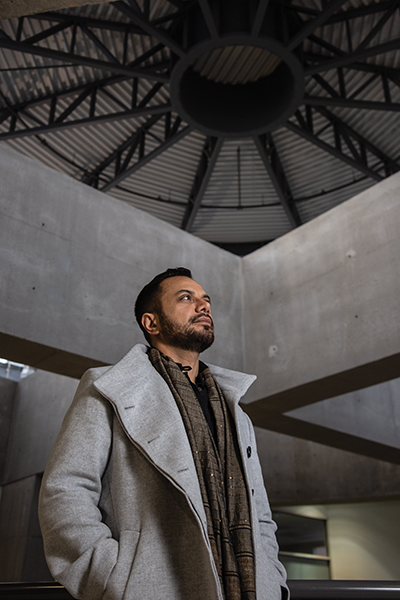 Mo knows now that he didn’t appreciate UFV enough when he was a student. He has returned for a variety of events, including as a panelist for an alumni marketing forum and as a moderator for an arts and culture round table.
Mo knows now that he didn’t appreciate UFV enough when he was a student. He has returned for a variety of events, including as a panelist for an alumni marketing forum and as a moderator for an arts and culture round table.
And he has a major fan in Satwinder Bains, the director of the the South Asian Studies Institute at UFV.
“Mo’s commitment to thoughtful dialogue, exchange, and action has been gratefully received by the South Asian Studies Institute at UFV for the past 10 years. While the exchange has been reciprocally facilitated as we also engage with many of Mo’s local objectives, it is really a testament to his deep and abiding family and cultural roots in the Fraser Valley that keep bringing him back to our university. I truly believe that we are the beneficiaries of his truly grounded vision in the arts, culture, and community.”
So the prodigal student has found a place at his alma mater.
“Now I feel a real responsibility to this place,” he muses. “I’m quite proud of what UFV has accomplished. UFV is nimble and agile and can do interesting work because of that. Satwinder Bains and the South Asian Studies Institute have made some great connections in the Punjab and here.”
Mo to Mo
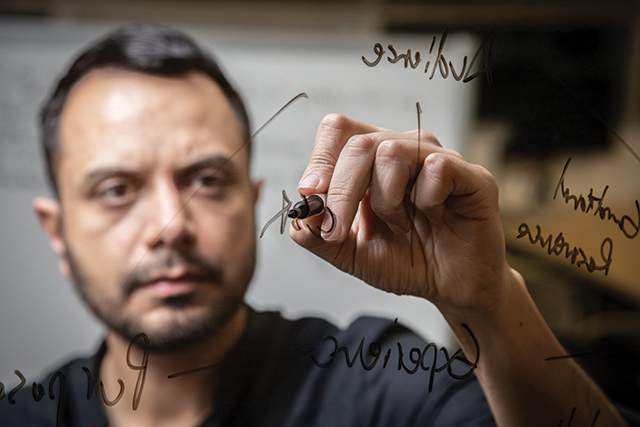 And his advice for younger Mo?
And his advice for younger Mo?
“At the time I was a student, I was immature. I should have calmed down and connected more when I was here, but I couldn’t quite do it.”
In hindsight, however, he did learn while he was here, and continues to draw on his education, even if it was an abbreviated one.
“Anthropology, philosophy, English, organizational behaviour… I trot it out all the time. We can’t predict the myriad ways in which our disparate experiences and points of knowledge are going to help us later in life. The benefits of learning can’t be predicted and we shouldn’t try. Learning and being challenged are necessary for their own sake.”
This story originally appeared in the 2019 edition of Skookum magazine. Written by Anne Russell, with illustrations by Marie Tary and photographs by Greg Laychak.


